Overview
The recent Occupy Wall Street protests have focused public attention on what organizers see as the excesses of America’s free market system, but perceptions of capitalism – and even of socialism – have changed little since early 2010 despite the recent tumult.
The American public’s take on capitalism remains mixed, with just slightly more saying they have a positive (50%) than a negative (40%) reaction to the term. That’s largely
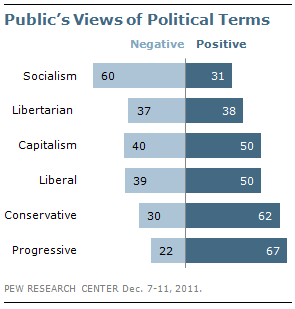
unchanged from a 52% to 37% balance of opinion in April 2010.
Socialism is a negative for most Americans, but certainly not all. Six-in-ten (60%) say they have a negative reaction to the word; 31% have a positive reaction. Those numbers are little changed from when the question was last asked in April 2010.
Of these terms, socialism is the more politically polarizing – the reaction is almost universally negative among conservatives, while generally positive among liberals. While there are substantial differences in how liberals and conservatives think of capitalism, the gaps are far narrower. Most notably, liberal Democrats and Occupy Wall Street supporters are as likely to view capitalism positively as negatively. And even among conservative Republicans and Tea Party supporters there is a significant minority who react negatively to capitalism.
These are among the findings of the latest national survey by the Pew Research Center for the People & the Press, conducted Dec. 7-11, 2011 among 1,521 adults that tests reactions to words frequently used in current political discourse. Another term in the news, libertarian, continues to receive a mixed public reaction: 38% have a positive view, 37% negative, and nearly a quarter (24%) have no opinion either way. Interestingly, some of the most positive views of libertarianism come from groups on both the left and the right of the political spectrum. People who agree with the Tea Party movement see libertarianism positively by a 51% to 36% margin, as do liberal Democrats by a 47% to 32% margin. And while the word libertarian receives a very positive reaction from younger Americans, older people tend to view it negatively.
Both of the ideological descriptions used most frequently in American politics – conservative and liberal – receive more positive than negative reactions from the American public. But the positives for conservative (62%) are higher than for liberal (50%). This gap mainly reflects the balance of what people call themselves; more people consistently call themselves conservative than liberal in public opinion polling. Those who think of themselves as politically “moderate” give similarly positive assessments to both words.
As many Democratic strategists have argued, the term progressive receives a far more positive reaction from the American public than the term liberal (67% vs 50%), though the difference is primarily among Republicans.
‘Socialism’ and ‘Capitalism’
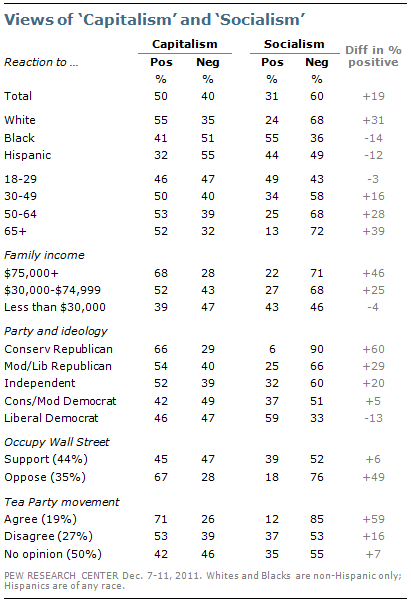
The term capitalism elicits more positive (50%) than negative (40%) reactions from the American public, but not by much. And while Americans of different incomes and ideological perspectives offer different opinions on capitalism, the divides are not as wide as on other terms measured.
More affluent Americans, as well as conservative Republicans, are more likely to offer positive than negative reactions to capitalism by two-to-one. And among people who agree with the Tea Party movement, 71% view capitalism positively. Yet within each of these groups, a quarter or more say they have a negative reaction to capitalism.
Notably, liberal Democrats and supporters of the Occupy Wall Street movement are not overtly critical of capitalism. In fact, as many offer positive as negative reactions in each of these groups.
By contrast, socialism is a far more divisive word, with wide differences of opinion along racial, generational, socioeconomic and political lines. Fully nine-in-ten conservative Republicans (90%) view socialism negatively, while nearly six-in-ten liberal Democrats (59%) react positively. Low-income Americans are twice as likely as higher-income Americans to offer a positive assessment of socialism (43% among those with incomes under $30,000, 22% among those earning $75,000 or more).
People under age 30 are divided in their views of both capitalism and socialism. But to Americans age 65 and older, socialism is clearly a negative (72%), not a positive (13%), term.
Mixed Views of ‘Libertarian’
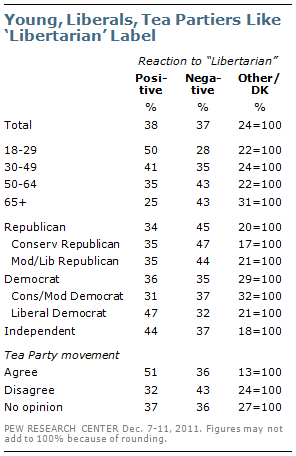
The American public remains divided over the word libertarian, with 38% offering a positive reaction, 37% a negative reaction, and 24% offering that they don’t have a reaction either way.
The steepest divide in reactions to the term libertarian are not political but generational. By a 50% to 28% margin, people under age 30 have more positive than negative feelings toward the term libertarian. Views are more split among those age 30-64, while those age 65 and older offer more negative (43%) than positive (25%) reactions.
Overall, there is only a small partisan divide when it comes to views of libertarianism – Republicans offer slightly more negative reactions than do Democrats or independents (45% vs. 35% and 37%, respectively). Independents have more positive reactions (44%) than either Republicans (34%) or Democrats (36%).
Liberal Democrats offer relatively positive assessments of libertarianism – 47% have a positive reaction and just 32% have a negative reaction. This is matched by the positive ratings among people who agree with the Tea Party movement – by a 51% to 36% margin they react positively to the word libertarian.
‘Conservative’ and ‘Liberal’
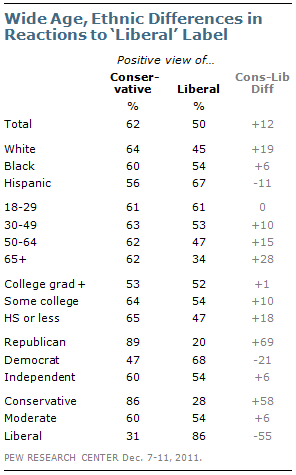
Republicans see the terms conservative and liberal in particularly stark terms. By an 89% to 8% margin they view the former positively, and by a 70% to 20% margin they view the latter negatively. Democrats are not as universal in their views. By a 68% to 22% margin they have a positive reaction to the word liberal, and at the same time they are equally likely to have a positive as a negative reaction to the word conservative (47% vs. 44%).
There is a sharp difference by age when it comes to the word liberal – while 61% of people under age 30 react positively, just 34% of those age 65 and older say the same. By contrast, reactions to the word conservative are almost identical across all age groups.
Public reactions to the word progressive are far more favorable than to the word liberal; two-thirds have a positive reaction to the
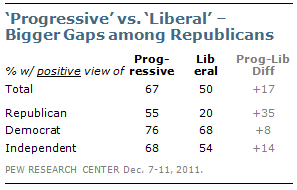
former compared with just half for the latter. There is very little difference among Democrats – who view both terms favorably. The largest difference is among Republicans most (55%) of whom have a positive reaction to the word progressive, and a negative (70%) reaction to the word liberal.



